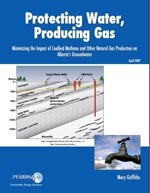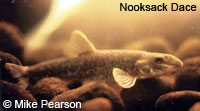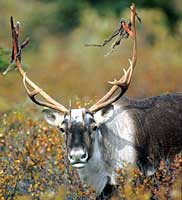
News |
- Ontarians Asked to 'Vote for Clean Energy'
- Manitoba Wildlands Starts Blogs
- UN Adopts Indigenous Rights Declaration
- Canada's Water Vulnerable to Thirsty US
- Alberta Halts Oilsands Exploration Below Lake
- Audit Begun: Manitoba Climate Change
- Groups Sue DFO Minister
- Governments Failing Woodland Caribou
- Public Action on Climate Plan Needed
- Western Climate Initiative Sets Regional Goal
- Beaudry and Nopiming Provincial Parks Expanded
- Premiers Nowhere on Climate Change
| Ontarians Asked to 'Vote for Clean Energy' | 24 September 07 |
 "Renewable is Doable" is the key message of a voter education campaign launched September 7, 2007 by WWF-Canada, The Pembina Institute, Greenpeace, Ontario Clean Air Alliance and Sierra Club, Ontario Chapter. "Renewable is Doable" is the key message of a voter education campaign launched September 7, 2007 by WWF-Canada, The Pembina Institute, Greenpeace, Ontario Clean Air Alliance and Sierra Club, Ontario Chapter."All political parties are courting the environmentally-conscious voter," said Dr. Keith Stewart of WWF-Canada. "People don't look to environmental groups to tell them who to vote for, they look to us for clear, reliable information that will help them to evaluate policies, which is what the Vote for Clean Energy campaign provides." The Vote for Clean Energy campaign and the groups involved are explicitly non-partisan. The campaign provides voters with useful and well-researched information about the opportunity for clean, climate-friendly energy in Ontario. The groups' objective is to mobilize voters to ask all political parties to make a credible plan for greening Ontario's energy system. They encourage Ontarians to make their October 10th ballot box decision based on who they think will build a healthier environment, economy and climate, for today and tomorrow. View September 7, 2007 press release on the Pembina Institute website Visit VoteForCleanEnergy.ca Sources: Pembina Institute, VoteForCleanEnergy.ca
|
|
| Manitoba Wildlands Starts Blogs | 18 September 07 |
 Manitoba Wildlands is now operating two single page websites through Web Networks, the non-profit social enterprise network for Canada. Manitoba Wildlands is now operating two single page websites through Web Networks, the non-profit social enterprise network for Canada.ChangingClimate.web.ca will include news items, recommended sites, and postings of national and international interest. Some Manitoba Wildlands.org elements will be included. Boreal.web.ca aims to bring attention to Canada's boreal regions. News items, events, recent boreal science, and citizen action are all likely contents. Both new websites include sets of links, and access to Manitoba Wildland sites. Manitoba Wildlands director, Gaile Whelan Enns said, "We experience a lot of national and international traffic on our main website. Often we have relevant, and timely information about Canada's climate and our boreal forest regions to provide to visitors. These new websites will help us get the word out on two critical and urgent topics." Visit ChangingClimate.web.ca Visit Boreal.web.ca View Manitoba Wildlands climate change pages View Manitoba Wildlands forests pages Source: Manitoba Wildlands
|
|
| UN Adopts Indigenous Rights Declaration | 18 September 07 |
 The UN General Assembly adopted September 13 the Declaration on the Rights of Indigenous Peoples, despite opposition from Canada, New Zealand, the US and Australia. Eleven countries abstained from the vote. The UN General Assembly adopted September 13 the Declaration on the Rights of Indigenous Peoples, despite opposition from Canada, New Zealand, the US and Australia. Eleven countries abstained from the vote.The non-binding declaration sets out global human rights standards for indigenous populations. Canada's UN ambassador, John McNee, said Canada had "significant concerns" over the declaration's wording on several provisions, in particular an article calling on states to obtain prior informed consent with indigenous groups before enacting new laws or administrative measures. Article 26 of the declaration states: "Indigenous peoples have the right to the lands, territories and resources which they have traditionally owned, occupied or otherwise used or acquired." Assembly of First Nations National Chief Phil Fontaine said the government is betraying Canada's worldwide legacy as a protector of human rights by going against a declaration Canadians helped draft. "In our view, it's a stain on Canada's reputation internationally," said Fontaine. Visit the UN Declaration on the rights of indigenous peoples pages View September 13, 2007 BBC News article View September 13, 2007 CBC News article View September 13, 2007 Reuters article View September 13, 2007 Agence France-Presse article View previous Manitoba Wildlands news items: August 15, 2007 - UN Focuses on Declaration of Rights December 18, 2006 - UN Delays Indigenous Rights Declaration Sources: CBC, Reuters
|
|
| Canada's Water Vulnerable to Thirsty US | 18 September 07 |
 Despite assurances from the federal government that Canada won't allow water exports, Canada remains vulnerable to water diversions to an increasingly thirsty United States. Despite assurances from the federal government that Canada won't allow water exports, Canada remains vulnerable to water diversions to an increasingly thirsty United States.This is the central message of a new research paper commissioned by The Munk Centre for International Studies at the University of Toronto, authored by Andrew Nikiforuk, a Calgary based award winning business and environmental reporter. The paper concludes that various bans federal and provincial governments have put in place against bulk shipments "probably will not stand up to court challenges." It also says the status of water as a tradable commodity remains ambiguous under The North American Free-Trade Agreement. Water exports also appear to be open for discussion in the Security and Prosperity Partnership (SPP) of North America, the three-way forum set up by Canada, the United States and Mexico to expand continental integration. Adele Hurley, Director of The Munk Centre's program on water issues, noted in an interview, "I think it's important for Canadians to understand that there is growing demand for our water and that in the final analysis, we're not really protected". View September 10, 2007 Globe and Mail article View September 10, 2007 Ottawa Citizen article View September 13, 2007 Council of Canadians press release View September 2007 Munk Centre for International Studies report, On the Table: Water, Energy and North American Integration (PDF) View information from the Council of Canadians on Bulk Water Exports Source: Globe and Mail
|
|
| Alberta Halts Oilsands Exploration Below Lake | 18 September 07 |
 Albertans claimed victory as the provincial government halted a plan to allow controversial seismic testing on Marie Lake. Albertans claimed victory as the provincial government halted a plan to allow controversial seismic testing on Marie Lake.Premier Ed Stelmach announced September 4th there were too many safety questions about the technology involved in drilling for oilsands under water. Groups such as the Marie Lake Air and Watershed Society (MLAWS) and The Pembina Institute, as well as members of the Liberal opposition in Alberta's Legislature, have been working to prevent the oil sands rush from destroying part of Alberta's natural heritage. Calgary-based OSUM - Oilsands Underground Mining Corp. - had been granted permission earlier this year to conduct tests which would have included firing of loud air guns in the water and blasting of dynamite on shore. Residents of the northeast Alberta lake were against the testing because they worried it would kill fish and ruin the ecosystem. Stelmach says the government's old policies weren't up to handling underwater drilling for bitumen, and he says he has asked for a new policy to be developed. Marie Lake is one of the few lakes of exceptional water quality left in Alberta. View September 5, 2007 Canadian Press article on CNews View July/August 2007 Pembina Institute news article (#7) View April 30, 2007 Pembina Institute publication, Protecting Water, Producing Gas View Pembina Institute Fact Sheet on impacts of natural gas and coalbed methane on groundwater (PDF) Sources: Canadian Press, Pembina Institute
|
|
| Audit Begun: Manitoba Climate Change | 12 September 07 |
 Manitoba Wildlands is auditing the Manitoba government's climate change targets, actions and commitments. Manitoba Wildlands is auditing the Manitoba government's climate change targets, actions and commitments. Manitoba's 2002 climate change plan is approaching the five-year mark. Various targets for greenhouse gases (GHG) reductions have been released. Premier Doer's claim during the spring 2007 election that 2001 Climate Change Task Force Report recommendations have been acted on caused Manitoba Wildlands to audit Manitoba's climate change commitments. "Manitoba Wildlands decided to examine the state of government climate actions, and as a first product, we are releasing our analysis of 2001 Climate Change Task Force actions", said Gaile Whelan Enns, Manitoba Wildlands' Director. "Clearly there is more work to be done to address recommendations in this report." Manitoba Wildlands found based on recommendations contained in the Executive Summary of the 2001 Climate Change Task Force:
View 2007 NDP election commitment regarding the 2001 Manitoba Climate Change Task Force report (refer to page 5) (PDF) View Manitoba Wildlands listing of 2001 Manitoba Climate Change Task Force report recommendations (PDF) View Manitoba Wildlands' September 2007 analysis September 2001 Manitoba Climate Change Task Force report actions provided by Manitoba government (PDF) View Manitoba Wildlands' September 2007 document regarding Manitoba GHG emissions reductions targets, reporting and actions (PDF) View Manitoba Wildlands 2007 election survey regarding Climate Change View Manitoba Wildlands climate change pages Sources: Government of Manitoba, Manitoba Wildlands
|
|
| Groups Sue DFO Minister | 12 September 07 |
 Environmental groups filed a lawsuit against Canada's Minister of Fisheries and Oceans for refusing to identify critical habitat (contrary to scientific advice) and critically weakening the recovery strategy for the Nooksack dace, which lives in small BC Fraser Valley streams. Environmental groups filed a lawsuit against Canada's Minister of Fisheries and Oceans for refusing to identify critical habitat (contrary to scientific advice) and critically weakening the recovery strategy for the Nooksack dace, which lives in small BC Fraser Valley streams.Three members of the government-appointed Nooksack dace scientific recovery team took the unusual step of speaking publicly about the Minister's decision, arguing that it reflects a systematic failure nationwide to adequately protect the habitat of endangered species. Sierra Legal launched the lawsuit on behalf of Environmental Defense, Georgia Strait Alliance, and the Wilderness Committee. The groups are arguing that failure to identify critical habitat in the recovery strategy represents a refusal by the federal government to enforce SARA. Canada's Species at Risk Act (SARA) requires identification of habitat critical to a species' survival in recovery strategies to the fullest extent possible. Officials with Fisheries and Oceans removed sections from a draft version of the recovery strategy identifying critical habitat of the Nooksack dace. "Protecting habitat is the single most important step in recovery of species at risk - and for the dace this needs to be done now," said Dr. Michael Pearson, lead author of the recovery strategy, and a biologist who has spent ten years studying the Nooksack dace. View August 23, 2007 Sierra Legal Defense press release View Sierra Legal media backgrounder View August 22, 2007 application filed in federal court (PDF) View the Nooksack dace recovery strategy draft from 2005, with critical habitat, used in public consultations in the Fraser Valley (PDF) View the final draft Nooksack Dace recovery strategy, as recently posted on the SARA registry, without critical habitat (PDF) Source: Sierra Legal Defense Fund
|
|
| Governments Failing Woodland Caribou | 12 September 07 |
 A growing body of research emphasizes that large intact forest areas are essential to the survival of woodland caribou. But Ontario is extending logging further north and Manitoba is dragging its feet despite clear indications of needed action and commitments to take such action. A growing body of research emphasizes that large intact forest areas are essential to the survival of woodland caribou. But Ontario is extending logging further north and Manitoba is dragging its feet despite clear indications of needed action and commitments to take such action.Ontario has granted cutting rights to an area covering 10,876 square kilometres in prime woodland caribou habitat. The plan is to log up to 250 square kilometres of the forest every 20 years. However, recent Trent University research found that caribou need a median range of 9,000 square kilometres of undisturbed habitat, surrounded by a 13-kilometre buffer zone, to maintain local populations. The study also says there is no evidence that caribou have ever returned to a cutover area after trees have regrown. In Manitoba, a study by the Sierra Club of Canada and the Canadian Parks and Wilderness Society (CPAWS) says that although the Manitoba government has the right goals to recover its threatened boreal woodland caribou, action on those goals is emphatically lacking. "All the major threats to boreal woodland caribou across Canada stem from human-caused alteration of their habitat" said Jean Langlois, National Campaigns Director of Sierra Club of Canada. "The federal and provincial governments need to quit stalling, identify caribou habitat, and protect it." The study notes that "[n]o protected area, at present, is likely to suffice for the conservation of woodland caribou" and that "[t]his is a major gap in a recovery strategy for woodland caribou". View the September 1, 2007 Toronto Star article View the June 2007 Journal of Wildlife Management article, Woodland Caribou Extirpation and Anthropogenic Landscape Disturbance in Ontario View the August 29, 2007 Sierra Club of Canada and CPAWS Manitoba press release (PDF) View the August 2007 Sierra Club of Canada and CPAWS Manitoba publication, A Review of Manitoba's Conservation and Recovery Strategy for Boreal Woodland Caribou (PDF) Sources: Toronto Star, Sierra Club of Canada / CPAWS Manitoba
|
|
| Public Action on Climate Plan Needed | 06 September 07 |
 Climate Action Network (CAN) Canada is giving the public a chance to judge its federal government's action on climate change. Climate Action Network (CAN) Canada is giving the public a chance to judge its federal government's action on climate change.TakeRealAction.ca is a website where Canadians can send a message directly to the federal government about its ongoing refusal to meet Canada's environmental obligations under both Canadian law and the Kyoto Protocol. The Kyoto Protocol Implementation Act became law June 26, 2007. The law requires the government to produce a plan (within 60 days) to put Canada on course to meet its Kyoto target through regulations and other measures. The government's 37-page report released August 21st merely re-iterates the proposal the government announced in April - that would not reach Canada's 2008-2012 Kyoto target until after 2020. "If you or I violated a federal law, the police would be knocking at the door", said John Bennett, climateforchange.ca. "Unfortunately, it doesn't work that way when it's the government that breaks the law." Several environmental organizations plan to ask the federal courts to rule that the government failed to comply with Canadian law. The courts have the power to order the government to live up to the requirements of The Kyoto Protocol Implementation Act. The deadline for submitting public comments on the plan is September 20th. View the September 5, 2007 Climate Action Network (CAN) Canada release Visit TakeRealAction.ca and send Canada's federal government a message on climate change View the Government of Canada's Climate Change Plan for the Purposes of the Kyoto Protocol Implementation Act 2007 Source: Climate Action Network (CAN) Canada
|
|
| Western Climate Initiative Sets Regional Goal | 05 September 07 |
 The eight members of the Western Climate Initiative (WCI) have established a regional goal to reduce greenhouse gas (GHG) emissions to 15 percent below 2005 levels by 2020. The eight members of the Western Climate Initiative (WCI) have established a regional goal to reduce greenhouse gas (GHG) emissions to 15 percent below 2005 levels by 2020.The regional goal combines the individual GHG emissions goals WCI members set and does not replace members' individual goals. Manitoba's short-term (2010-2012) GHG emissions reduction target is stated as 6 percent below 1990 levels in the WCI announcement (in line with Canada's Kyoto Protocol targets). Manitoba is the only WCI member that has not established a target for 2020 and instead uses the same target as for 2010-2012, noting it expects to "meet or do better than its short term goal". Manitoba's 2002 Climate Change Action Plan indicates that "[b]y 2010, Manitoba's net contribution could equal a greenhouse gas reduction of up to 18 per cent from 1990 levels". Manitoba is currently in the process of updating its Climate Change Action Plan. No public data exists to show baseline emissions and actual emissions reductions for Manitoba. The WCI was created February 2007 with initial membership of Arizona, California, New Mexico, Oregon and Washington. Since February Utah and Canadian provinces British Columbia and Manitoba also joined the WCI. View August 22, 2007 Government of Manitoba press release View August 22, 2007 Western Climate Initiative Statement of Regional Goal (PDF) View Manitoba's 2002 Climate Change Action Plan, Kyoto and Beyond: A plan of action to meet and exceed Manitoba's Kyoto targets (PDF) (no longer posted by Manitoba government) Visit the Western Climate Initiative website Sources: Government of Manitoba, Western Climate Initiative
|
|
| Beaudry and Nopiming Provincial Parks Expanded | 04 September 07 |
 Manitoba Conservation Minister Stan Struthers made an announcement August 31, 2007 concerning expansion of protected land in Beaudry Park and Nopiming Provincial Park. Manitoba Conservation Minister Stan Struthers made an announcement August 31, 2007 concerning expansion of protected land in Beaudry Park and Nopiming Provincial Park.The Beaudry expansion announcement may lengthen a lease-agreement for 15 hectares of Assinniboine River bottom land between the Province and Mr. Marcel Taillieu first announced November 2004. Nopiming Provincial Park, north of the Whiteshell, will have 186 hectares of existing parkland reclassified as Backcountry. The land was formerly under the 'Resource Management' land use classification - which allows for industrial activities and is therefore not protected. The current status of these lands, whether they have been previously logged, is not included in the announcement. These lands have been under discussion - including for a larger transfer to protected status - for a decade. As of September 4, 2007, neither of these protected lands changes was formal or public through gazetting of regulations under The Parks Act. It is not clear whether the Beaudry Park change is actually going to be permanent. View August 31, 2007 Government of Manitoba press release View Manitoba Wildlands' original 2004 content on the Beaudry lease exchange View Manitoba Conservation website for Beaudry expansion (2004) View November 2005 public consultation for re-classification of lands in Nopiming Provincial Park (PDF) Source: Manitoba Conservation
|
|
| Premiers Nowhere on Climate Change | 28 August 07 |
 Despite urging by environmental groups and an agenda focused on energy and climate change, the final statement from the Council of the Federation - the name given to itself by the group comprised of Canada's provincial and territorial leaders - was less than earth-shattering.
Despite urging by environmental groups and an agenda focused on energy and climate change, the final statement from the Council of the Federation - the name given to itself by the group comprised of Canada's provincial and territorial leaders - was less than earth-shattering.The Edmonton Sun called it "flaccid, flabby and forlorn". This explains why Alberta Premier Ed Stelmach was able to sum up his perspective on the annual meeting that took place in Moncton August 8-10 with the statement, "Mission accomplished". The August 10th Moncton meetings press release does not refer to a nation-wide climate change plan with binding emissions reductions targets, and there is no announcement of a carbon credit trading framework. Instead, the premiers and territorial leaders agreed to "implement energy conservation strategies" that will only apply to provinces "within their own jurisdictions" and "according to each province's plan for climate change." View August 12, 2007 Edmonton Sun article Visit August 10, 2007 Council of the Federation press release (PDF) View the Council of the Federation report, Climate Change: Leading Practices by Provincial and Territorial Governments in Canada View August 10, 2007 Manitoba Wildlands news item Source: Stockholm International Water Institute, CBC News
|
|


 RSS Feeds:
RSS Feeds: